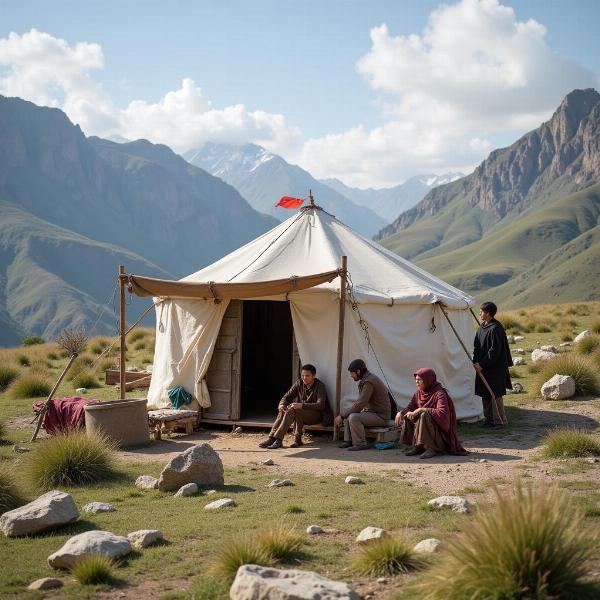Understanding the meaning of “dera” in Hindi is crucial for anyone navigating the rich tapestry of Indian culture and language. While often simply translated as “camp” or “settlement,” “dera” carries a deeper cultural significance, often intertwined with religious and social contexts. This article explores the multifaceted meaning of “dera” in Hindi, examining its various uses and nuances to provide a comprehensive understanding.
Exploring the Different Meanings of Dera
“Dera” in Hindi can encompass several meanings, depending on the context. It can refer to a temporary camp, a religious settlement, or even a place of rest. The word’s versatility adds to its richness and makes understanding its specific meaning in a given situation essential.
Dera as a Temporary Camp
In its most basic sense, “dera” denotes a temporary abode, often used by nomads, travelers, or armies. Think of a group of shepherds setting up a temporary shelter for themselves and their flock, or a traveling circus pitching its tents for a few days. This usage emphasizes the temporary and mobile nature of the dwelling.
Dera as a Religious Settlement
“Dera” also commonly refers to a religious settlement, often associated with a particular sect or guru. These deras can range from small, humble establishments to large, influential communities. They serve as centers for religious gatherings, teachings, and social activities. Understanding this meaning is particularly important when discussing religious figures or events in India.
Dera as a Place of Rest
Beyond the physical connotations, “dera” can also signify a place of rest, both physically and metaphorically. It can be used to describe a temporary stop on a journey, a haven, or even a state of mental peace. This metaphorical usage adds a layer of depth to the word, highlighting its connection to respite and tranquility.
“Dera” in Common Usage and Idioms
The word “dera” also finds its way into various Hindi idioms and expressions. For instance, “dera dalna” means to set up camp, while “dera uthana” means to pack up and leave. These idioms reflect the word’s connection to movement and temporary settlement.
Dera and its Socio-Cultural Significance
Understanding the term “dera” is important for grasping the social dynamics of certain regions in India. Deras often play a significant role in local communities, providing social support and influencing local politics. This influence underscores the importance of understanding the term beyond its literal meaning.
 Dera as a Temporary Camp
Dera as a Temporary Camp
Dera vs. Other Similar Words
While “dera” is often translated as “camp,” it’s important to differentiate it from other similar words in Hindi, such as “shivir” (camp) or “basti” (settlement). “Shivir” typically implies a more organized and structured camp, often for a specific purpose like a training camp. “Basti,” on the other hand, refers to a permanent settlement. Understanding these distinctions helps in choosing the most appropriate word in different contexts.
Dera: A Word with Multiple Layers
As we’ve seen, “dera” isn’t just a simple word; it carries a rich history and cultural significance. Its diverse meanings reflect the multifaceted nature of Indian society and its traditions.
Conclusion: Understanding “Dera” in Context
The meaning of “dera” in Hindi goes beyond a simple translation. It encompasses temporary shelters, religious settlements, and even metaphorical places of rest. By understanding its various uses and nuances, we gain a deeper appreciation for the richness of the Hindi language and the cultural context in which it thrives. Recognizing the different meanings of “dera” will enhance your understanding of Indian culture and communication.
FAQ
- What is the most common meaning of “dera” in Hindi? The most common meanings are “temporary camp” and “religious settlement.”
- How does “dera” differ from “shivir”? “Dera” suggests a more informal and temporary setup, while “shivir” often refers to a more organized camp.
- Is “dera” always a physical place? No, it can also metaphorically refer to a place of rest or peace.
- Why is it important to understand the meaning of “dera”? Understanding “dera” helps in navigating conversations about Indian culture, religion, and social dynamics.
- What are some common idioms using “dera”? “Dera dalna” (to set up camp) and “dera uthana” (to pack up and leave) are common examples.
- Can “dera” be used in a formal context? While it’s more common in informal settings, it can be used formally when discussing specific religious or cultural contexts.
- What is the literal translation of “dera”? The literal translation can vary but often equates to “camp,” “settlement,” or “encampment.”
Meaning-Hindi.in is your premier destination for high-quality Hindi translation services. We specialize in a range of translation needs, from business and legal documents to technical manuals and website localization. Our team of expert linguists ensures accuracy and cultural sensitivity in every project. Whether you need business document translation or specialized legal translation, our expertise covers diverse fields, ensuring precise and culturally nuanced results. Contact us today for all your Hindi translation needs at [email protected] or call us at +91 11-4502-7584. Meaning-Hindi.in is committed to bridging language barriers and fostering clear communication.